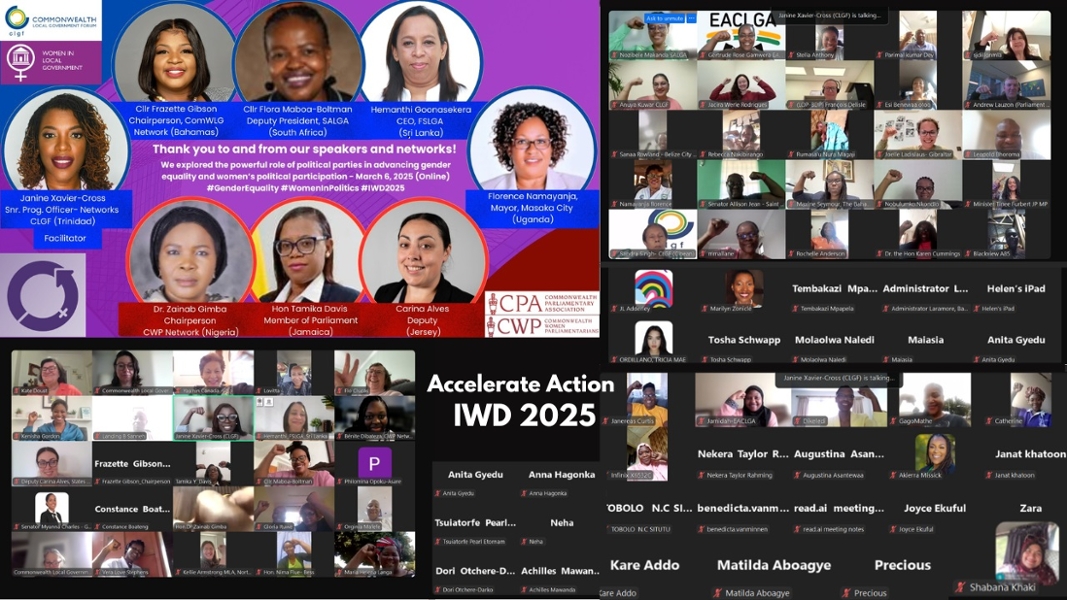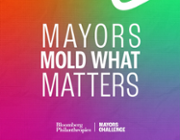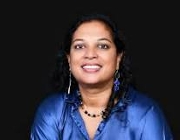International Women's Day Dialogue – Women and Political Parties

07 March 2025
CLGF and CPA come together to discuss the role of political parties in women’s political empowerment at all levels.
Ahead of International Women’s Day 2025 on Saturday, 8 March, CLGF joined forces with the Commonwealth Parliamentary Association to hold a webinar on Women’s political participation and the role of political parties. Particularly appropriate as the theme of this year’s International Women’s Day is 'Accelerate Action,' calling for rapid advancements in gender equality and focusing on recognising the strategies and tools that drive women's progress in education, employment, and leadership.
Empowering women to impact their lives
With participation of over a hundred and fifty people from across the Commonwealth, the event was opened by Frazette Gibson, Chairperson of the Commonwealth Women in Local Government Network (ComWLG) who set the scene. Having recently completed her second term as the Chief Councillor for Freeport in the Bahamas, she talked about the goal of the ComWLG, which was established in 2017, and the focus on getting women into politics and, ultimately creating a world where women are empowered to impact the systems that affect their lives, both locally and globally. She also explained that CPA’s Commonwealth Women’s Parliamentarians Network (CWP) was established in 1989 and now boasts some 3000 women members.
Gateway or gatekeeper
The webinar set out to look at the importance of political parties in achieving a more equitable political landscape, stressing that political parties can be gateways or gatekeepers. Understanding the landscape in which we operate is vital in addressing resistance by political parties in increasing women’s representation in politics. Ms Gibson stressed that it is important to reflect not just on the challenges, but to draw inspiration from those already working in politics, to ensure that political parties are the true allies in fighting for equality in political representation.
Slowdown in electing women
CLGF Senior Programme Officer, Janine Xavier-Cross provided further context, based on the feedback in a short survey of those taking part in the webinar. While 2024 was an important year for elections, it showed the slowest movement for women to be elected to both parliament and local government. Women’s participation in local government stands at 27% but varies from 3.8% to 56%, demonstrating that progress is inconsistent. In parliament, the figures are on average 25.8% women parliamentarians. These figures include women elected both through proportional representation (PR) and ward based systems, with PR appearing to enhance gender equality and increase the number of women, although this is reliant on the party leadership prioritising gender inclusion.
Political parties crucial to increasing women in politics
With the ward system, there can be cultural and patriarchal biases and often women report more challenging financial constraints. Feedback did reveal that the role of political parties is overwhelmingly important to getting women elected and can play a major role in shaping campaigns. While there have been very significant strides in some areas, important challenges remain and major reforms within political parties are vital.
A diverse range of speakers were invited to talk about their personal experience and reflect on the actions that political parties should take. They included:
- Frazette Gibson, Chairperson, ComWLG Network, CLGF (Bahamas)
- Hon Dr Zainab Gimba, Chairperson, Commonwealth Women Parliamentarians, CPA (Nigeria)
- Hon Florence Namayanja, Mayor, Masaka City (Uganda)
- Hon Carina Alves, Deputy, St. Helier Central, Jersey
- Councillor Flora Maboa-Boltman, Deputy President, South African Local Government Association (SALGA) (South Africa)
- Hemanthi Goonasekera, CEO, Federation of Sri Lankan Local Government Authorities (FSLGA) (Sri Lanka)
- Hon Tamika Davis, Member of Parliament (Jamaica)
Hon Florence Namayanja, Mayor, Masaka City, Uganda described how being in the opposition party requires much strength and determination, but that her party, the National Unity Party, has been very supportive; and it was this strength that had made an important contribution to her success in elections. She highlighted challenges facing women in the disparities between men and women in education, responsiblity for caring for family, and the ability to raise campaign finance as key barriers to women entering and advancing in politics in Uganda. She stressed that the quota system is strong in getting women into political positions but that these seats can be dominated by the same repeating candidates.
Hon Carina Alves, Deputy, St. Helier Central, Jersey (United Kingdom) was first elected to the Jersey Parliament in 2018, having worked in many public sector roles, including as a teacher. She talked about the lack of confidence to enter parliament due to a lack of political education and self-belief. Having confided in a friend who had connections to the only political party at the time, she was encouraged to stand and received much support in the form of training and mentorship. She cited her mother as being a very important influence, prioritising her political education growing up and she recommended increasing awareness and education on the importance of the political process for young people. She made the point that increasing women’s representation is vital to inspiring others to see themselves as political representatives and that we all have the power to lift someone up.
Cllr Flora Maboa-Boltman, Deputy President of the South African Local Government Association (SALGA), talked about the struggle of women in entering a male dominated arena, with financial constraints, lack of networking and fundraising opportunities often limiting women’s ability to campaign. She talked of the violence, harassment and intimidation that deters so many women from putting their names forward. Culture, in the form of traditional women’s roles, can also prevent women from standing as they are also expected to run the home and care for the family. She called for greater protection against political violence, through stricter laws and security for women; and emphasised the value of mentoring support. She also stressed that education for boys and girls on gender equality and normalising women as an equal part of society were vital.
Hemanthi Goonasekera, CEO, Federation of Sri Lankan Local Government Authorities (FSLGA) (Sri Lanka) described how a 25% quota system for women was granted in 2018, but that the political parties were not ready and did not have enough candidates to field. Since then, the number of women in local government has increased from 431 to 1982 and they are looking to the next local elections. which are over-due, to build on this. Building women’s caucuses has been invaluable, and bringing women together from different parties to share experiences has helped in encouraging women to stand. The Local Government Association has played an important role by providing capacity building, including for young women, to sow the seeds of the role for women and their invaluable contribution to decision-making. She emphasised the role of networking and peer learning, and the great value of using case studies.
Hon Tamika Davis from Jamaica became an MP in 2020, having no political background or interest in the subject. She pointed out how daunting it is for women ‘on the outside, looking in’ to believe that they can make a valuable contribution. It is obviously good for everyone to have 50% women’s representation, and Jamaica now has 29% of women as parliamentarians. She praised the creation of a women’s caucus, spanning not just the main political parties, but also the two houses in the bicameral parliament. Enshrined in law, this should guarantee that the dialogue between women in politics will continue for years to come. Jamaica has seen an increase in the number of women wishing to stand and is looking to encourage more, including young women. She highlighted the disparity between men and women, with the former having much more flexibility and time to be able to secure financial support for their campaign.
After the formal presentations, a discussion elicited views and experiences from a cross section of participants:
Priorities for future action
Hon Dr Zainab Gimba, Chairperson, Commonwealth Women Parliamentarians, CPA (Nigeria) provided a summing up which touched on the following key priorities:
- The power of legislation and policy to ensure that political parties are inclusive and equitable organisations and nominate women into safe seats
- The importance of political education to encourage and empower women from all walks of life to understand the change that they can make through political leadership
- The importance of networking and caucuses to empower women leaders and to ensure that there are female role models to inspire future leaders
- The need to address both political and electoral violence, particularly against women, but also all forms of gender-based violence which impact on women’s confidence to stand for election
- The impact that quotas can have to support women into leadership
- The need for political parties/governments to address campaign finance and electoral finance to level the playing field for all candidates
A full recording of the webinar is available and the work towards empowering women and girls politically continues across the Commonwealth. CLGF and CPA will be sharing a report of the meeting and exploring ways to follow up with practical action.
Wherever you mark International Women’s Day 2025, please celebrate the progress we are making in ensuring gender equality and parity, but redouble your efforts to help accelerate progress.
Back to News





